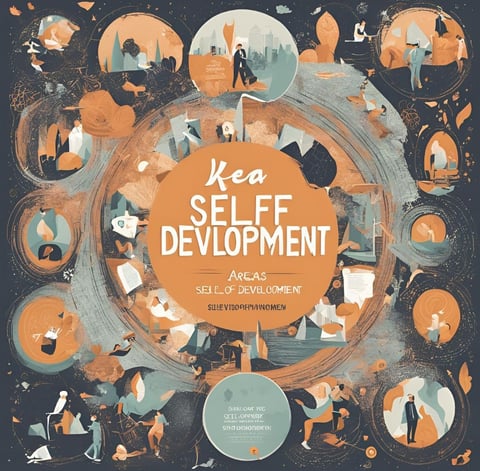The Meaning of Self-Development and Its Role in Personal Growth
What does it mean to truly grow as a person? Self-development, often referred to as personal growth, is the journey of enhancing your skills, mindset, and emotional well-being to achieve your fullest potential. In today’s fast-paced world, self-development is more crucial than ever, providing the tools to overcome challenges, unlock new opportunities, and lead a fulfilling life. This article will explore the essence of self-development, its benefits, and actionable steps to get started.
SELF-HELP
kanav pareek
1/16/20254 min read


The Meaning of Self-Development and Its Role in Personal Growth
Introduction
What does it mean to truly grow as a person? Self-development, often referred to as personal growth, is the journey of enhancing your skills, mindset, and emotional well-being to achieve your fullest potential. In today’s fast-paced world, self-development is more crucial than ever, providing the tools to overcome challenges, unlock new opportunities, and lead a fulfilling life. This article will explore the essence of self-development, its benefits, and actionable steps to get started.
Understanding Self-Development
What Is Self-Development?
Self-development is the conscious process of improving various aspects of one’s life, including intellectual, emotional, physical, and social capacities. It is rooted in the idea of becoming the best version of yourself by setting goals, acquiring new skills, and cultivating habits that promote growth. The journey is deeply personal and can vary widely, but the core remains universal: striving for betterment.
Self-Development vs. Self-Improvement
While these terms are often used interchangeably, they are not identical. Self-improvement focuses on addressing weaknesses or enhancing specific areas of life, such as learning a new skill. In contrast, self-development is a broader concept, encompassing a holistic transformation of one’s character, mindset, and lifestyle. Think of it as the difference between fixing a single aspect and revamping the entire system.
Importance of Self-Development
Why bother with self-development? Because it equips you to face life’s challenges with resilience and confidence. Whether it’s advancing in your career, navigating relationships, or managing stress, self-development lays the foundation for success and adaptability in all areas of life.
Key Areas of Self-Development
Emotional Development
Your emotions significantly influence your decisions and relationships. Developing emotional intelligence—understanding and managing your emotions—enables you to communicate effectively, build empathy, and resolve conflicts gracefully.
Intellectual Growth
Continuous learning is the cornerstone of personal growth. Whether it’s pursuing higher education, learning a new language, or simply picking up a hobby, intellectual growth keeps your mind sharp and your curiosity alive.
Physical Health and Wellness
A healthy body fuels a healthy mind. Regular exercise, balanced nutrition, and adequate sleep not only boost physical stamina but also enhance mental clarity and emotional stability.
Social Development
Humans are social beings, and meaningful relationships contribute significantly to our happiness. Improving communication skills, fostering connections, and expanding your network are vital aspects of social development.
Setting Goals for Self-Development
The first step in self-development is setting clear, actionable goals. Without a destination, your journey might feel aimless. One of the most effective frameworks for setting goals is the SMART method—Specific, Measurable, Achievable, Relevant, and Time-bound. For example, instead of saying, “I want to be healthier,” you could set a SMART goal like, “I will exercise for 30 minutes five days a week for the next three months.”
Well-defined goals provide a sense of direction and help track your progress. Start with small, attainable objectives and gradually aim for bigger milestones.
Creating a Self-Development Plan
A self-development plan serves as a roadmap for your growth. Begin by identifying areas you want to improve—be it your career, relationships, health, or emotional well-being. Break down your goals into daily or weekly habits, like reading for 20 minutes a day or practicing gratitude journaling.
Additionally, balance is key. Overloading yourself with too many goals can lead to burnout. Prioritize a few critical areas and allocate your time wisely. A well-structured plan aligns your daily actions with your long-term vision, ensuring steady progress.
Practical Strategies for Self-Development
Importance of Reading and Education
Books and courses are treasure troves of knowledge and inspiration. Whether you prefer self-help books, biographies, or online courses, education fuels your growth. Start with classics like “Atomic Habits” by James Clear or “The 7 Habits of Highly Effective People” by Stephen Covey.
Reading expands your perspective, introduces new ideas, and often provides actionable advice. Pairing reading with practical application ensures you’re not just absorbing information but also implementing it.
Mindfulness and Meditation
In today’s world of constant distractions, mindfulness is a game-changer. Practicing mindfulness helps you stay present, reduce stress, and cultivate a sense of inner peace. Begin with simple exercises like focusing on your breath or guided meditations through apps like Calm or Headspace.
Meditation also fosters self-awareness, a cornerstone of personal growth. With just 10 minutes a day, you can enhance your mental clarity, emotional stability, and overall well-being.
Leveraging Feedback and Self-Reflection
Feedback is a mirror that shows you areas for improvement. Seek constructive criticism from trusted mentors, colleagues, or friends. Pair external feedback with self-reflection to evaluate your strengths, weaknesses, and progress.
Journaling is an excellent tool for self-reflection. Write about your achievements, challenges, and lessons learned. Over time, these insights become invaluable in shaping your growth journey.
Challenges in Self-Development
Common Obstacles to Self-Development
The road to self-development isn’t always smooth. Procrastination, fear of failure, and self-doubt often derail progress. Recognize these challenges and address them proactively. For instance, if procrastination is your Achilles' heel, break tasks into smaller, manageable steps.
Additionally, perfectionism can be a hindrance. Embrace the concept of “progress over perfection” and focus on consistent effort rather than flawless execution.
Staying Consistent with Self-Development
Consistency is the secret sauce of self-development. Set reminders, create accountability systems, and celebrate small wins to stay motivated. Surrounding yourself with a supportive community or joining groups with similar interests can also provide encouragement.
The Benefits of Embracing Self-Development
Engaging in self-development transforms every facet of your life. Here are some key benefits:
Enhanced Self-Awareness: Understand your values, motivations, and behaviors better.
Improved Confidence: Achieving goals boosts self-esteem and belief in your abilities.
Stronger Relationships: Emotional intelligence fosters healthier connections.
Career Success: New skills and improved adaptability make you a valuable asset professionally.
Personal Fulfillment: Aligning your life with your aspirations leads to a sense of purpose and joy.
Conclusion
Self-development is not a one-time task but a lifelong journey. It’s about consistently investing in yourself, overcoming challenges, and striving for personal growth. By setting goals, building habits, and embracing change, you can unlock your true potential and lead a more meaningful life.
FAQs
What does self-development mean in simple terms?
It’s the process of improving yourself in various areas, like skills, mindset, and well-being, to achieve personal and professional growth.How is self-development related to success?
Self-development equips you with the tools, knowledge, and mindset to overcome challenges, seize opportunities, and reach your goals.Can self-development improve mental health?
Absolutely! Practices like mindfulness, emotional intelligence, and stress management are integral to both self-development and mental health.How can I start self-development if I lack time?
Focus on small, manageable steps. For instance, dedicate 10–15 minutes daily to reading, meditation, or journaling.What are some tools for tracking self-development progress?
Use journals, apps like Notion or Evernote, and feedback from peers or mentors to measure your growth effectively.


Blog
Content
Engage
contact@growthtimewithme.com
© 2024. All rights reserved.
